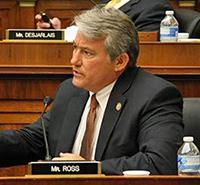
Dennis Ross's HUD Reform Clears the House
Part of the House leadership as deputy majority whip, U.S. Rep. Dennis Ross, R-Fla., scored a win on Tuesday as the House passed his Private Investment in Housing Act of 2015. The bill gives the U.S. Department of Housing and Urban Development (HUD) authorization to create a “demonstration project that will encourage private-sector entities to retrofit and modernize a limited number of HUD multi-family housing units at absolutely no cost to taxpayer dollars.”
 Ross took to the House floor on Tuesday to explain his bill.
Ross took to the House floor on Tuesday to explain his bill.
“Currently, HUD spends more than $7 billion in annual energy and water costs,” Ross said on the House floor on Tuesday. “In our current fiscal environment, we must look to new technology and for innovative solutions to generate savings for both taxpayers and the federal government.Today, I am proud to ask my colleagues to join me in supporting bipartisan HR 2997, the Private Investment in Housing Act. This legislation will establish a demonstration project that will encourage private-sector entities to retrofit and modernize a limited number of HUD multi-family housing units at absolutely no cost to taxpayer dollars
“This legislation is necessary because nonprofits and other entities that focus on financing for affordable housing are unable to enter into contractual agreements to retrofit HUD multi-family housing units,” Ross added. “It does not involve any risk to the federal government or the taxpayer. In fact, investors take the first loss position on energy upgrades. If energy savings from these projects are not realized after private entities enter into these contracts, the federal government does not pay -- period. If savings through these projects are achieved, they would lower HUD’s energy expenditures by as much as 20 percent, creating tremendous savings for the taxpayer. Private entities who take on the risk to retrofit these units will receive a $1 return for every $1 in cost-savings that are verified by a third party. The demonstration program created by this legislation would help improve up to 20,000 HUD-assisted apartments receiving project-based rental assistance, supportive housing for the elderly, or supportive housing for persons with disabilities.
“This demonstration project will help a limited number of people at first in Florida and across the country; however, over time, once it is a proven success, more of the 48,621 eligible properties in the state of Florida, and the 900 units in my district alone may be able to benefit – at no expense to the taxpayer,” Ross added. “In addition to the direct economic benefits to taxpayers, these upgrades will bring meaningful health and other benefits to the families living in the buildings, creating a healthier and safer environment for residents.
“With that, I ask that you join me in supporting this legislation to engage the private sector to help HUD reduce its more than $7 billion in current annual energy and water spending,” Ross said in conclusion.
Comments are now closed.

